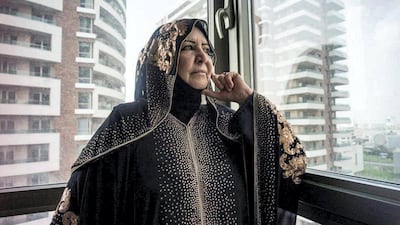A documentary on the US-led Iraq war of 2003, told by Iraqis who lived through it, won a Bafta TV Award for the Best Factual Series on Monday.
Once Upon a Time in Iraq, directed by James Bluemel and narrated by Andy Serkis, is a five-part documentary that was broadcast on BBC Two in July 2020.
The series humanised the Iraq war and gave a platform to voiceless Iraqis, whose stories were buried by the destruction of the conflict.
The documentary is an honest and harrowing account of how the invasion changed not only their lives, but the world.
During his acceptance speech Bluemel thanked his team whose members "brought something brilliant and unique to the documentary".
The US-led invasion of Iraq that followed the fall of Baghdad on April 9, 2003, and the toppling of Saddam Hussein's statue in Firdos Square shortly after, led to decades of war and conflict from which the country still suffers.
The documentary captures the experiences of Iraqis through the chaos, poverty and sectarian wars they endured by giving them the chance to talk about their personal memories.
Bluemel and his team consulted with Renad Mansour, senior research fellow and director of the Iraq initiative at London's Chatham House, to ensure the narrative of 2003 is seen in a historical manner.
"The way the director and his team tried to revisit Iraq from 2003 were taken into account, which meant that questions such as, 'What are the lessons?' and 'How should history be told through the voices of those who haven't had a say?', were considered," Mr Mansour told The National.
“This is what made it special to me,” he said.
The team interviewed a variety of people, Iraqis and Americans, as well as politicians, but felt that "they have already had their say and that it's time to give the say to those who are negatively impacted by this war".
The documentary is a platform that gives a voice to Iraqis from all walks of life not previously able to tell their story, he said.
Mr Mansour said he was in awe of the response he received from people who previously showed little interest in Iraq or the research papers he wrote.
"I mean my neighbour, my teammates on my football team, so many people who I never talk to about my work in Iraq, were interested in the documentary and the story," he said.
Bluemel and Mr Mansour jointly wrote a book about the documentary, which includes interviews and testimonies of those who lived through the horrors of the invasion.
Types of policy
Term life insurance: this is the cheapest and most-popular form of life cover. You pay a regular monthly premium for a pre-agreed period, typically anything between five and 25 years, or possibly longer. If you die within that time, the policy will pay a cash lump sum, which is typically tax-free even outside the UAE. If you die after the policy ends, you do not get anything in return. There is no cash-in value at any time. Once you stop paying premiums, cover stops.
Whole-of-life insurance: as its name suggests, this type of life cover is designed to run for the rest of your life. You pay regular monthly premiums and in return, get a guaranteed cash lump sum whenever you die. As a result, premiums are typically much higher than one term life insurance, although they do not usually increase with age. In some cases, you have to keep up premiums for as long as you live, although there may be a cut-off period, say, at age 80 but it can go as high as 95. There are penalties if you don’t last the course and you may get a lot less than you paid in.
Critical illness cover: this pays a cash lump sum if you suffer from a serious illness such as cancer, heart disease or stroke. Some policies cover as many as 50 different illnesses, although cancer triggers by far the most claims. The payout is designed to cover major financial responsibilities such as a mortgage or children’s education fees if you fall ill and are unable to work. It is cost effective to combine it with life insurance, with the policy paying out once if you either die or suffer a serious illness.
Income protection: this pays a replacement income if you fall ill and are unable to continue working. On the best policies, this will continue either until you recover, or reach retirement age. Unlike critical illness cover, policies will typically pay out for stress and musculoskeletal problems such as back trouble.
UAE currency: the story behind the money in your pockets
Ziina users can donate to relief efforts in Beirut
Ziina users will be able to use the app to help relief efforts in Beirut, which has been left reeling after an August blast caused an estimated $15 billion in damage and left thousands homeless. Ziina has partnered with the United Nations High Commissioner for Refugees to raise money for the Lebanese capital, co-founder Faisal Toukan says. “As of October 1, the UNHCR has the first certified badge on Ziina and is automatically part of user's top friends' list during this campaign. Users can now donate any amount to the Beirut relief with two clicks. The money raised will go towards rebuilding houses for the families that were impacted by the explosion.”
Blackpink World Tour [Born Pink] In Cinemas
Starring: Rose, Jisoo, Jennie, Lisa
Directors: Min Geun, Oh Yoon-Dong
Rating: 3/5
Labour dispute
The insured employee may still file an ILOE claim even if a labour dispute is ongoing post termination, but the insurer may suspend or reject payment, until the courts resolve the dispute, especially if the reason for termination is contested. The outcome of the labour court proceedings can directly affect eligibility.
- Abdullah Ishnaneh, Partner, BSA Law



